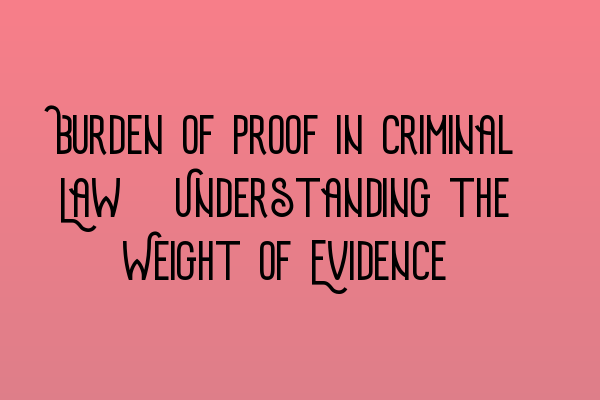Burden of Proof in Criminal Law: Understanding the Weight of Evidence
Welcome to the SQE Criminal Law & Practice Law UK blog. Today, we will delve into an important aspect of criminal law – the burden of proof. As legal professionals, it is crucial to understand the weight of evidence required to prove guilt or establish innocence in criminal cases.
What is the Burden of Proof?
In criminal law, the burden of proof rests on the prosecution. This means that it is the responsibility of the prosecution to present sufficient evidence to convince the court beyond a reasonable doubt that the defendant committed the alleged crime. The burden of proof is a fundamental principle in criminal proceedings and is designed to protect the rights of the accused.
It is essential to note that the burden of proof differs from the standard of proof. The standard of proof refers to the level of certainty required to establish guilt. In criminal cases, the standard of proof is ‘beyond a reasonable doubt,’ which is a higher threshold than ‘balance of probabilities’ used in civil cases.
Weight of Evidence
The weight of evidence refers to the strength or importance of the evidence presented during a trial. The more compelling the evidence, the greater the weight it carries in swaying the judge or jury’s decision.
“To convict an individual of a crime, the weight of evidence must establish guilt beyond a reasonable doubt.”
In criminal law, the weight of evidence plays a significant role in determining an individual’s guilt or innocence. The court considers factors such as the credibility of witnesses, expert testimony, forensic evidence, and any other relevant evidence presented by the prosecution and defense. It is the responsibility of the court to carefully evaluate the weight of evidence before reaching a verdict.
To better understand the concept, let’s consider a hypothetical case:
John is accused of theft. The prosecution presents surveillance footage showing John at the scene of the crime, witnesses who claim to have seen him steal the item, and fingerprints matching John’s on the stolen item. On the other hand, the defense presents an alibi witness and argues that the fingerprints might have been contaminated. In this case, the weight of evidence is crucial in determining whether John is guilty beyond a reasonable doubt.
Implications for Criminal Practice
Understanding the burden of proof and the weight of evidence is crucial for both prosecutors and defense lawyers. Prosecutors must gather strong evidence to meet the burden of proof, ensuring a fair trial for the accused. Defense lawyers, on the other hand, must scrutinize the weight of evidence presented by the prosecution and challenge its credibility or reliability if necessary.
Aspiring legal professionals preparing for the SQE 1 or SQE 2 examinations can benefit from SQE 1 Practice Exam Questions and SQE 1 Practice Mocks FLK1 FLK2 to enhance their understanding of criminal law principles and the application of the burden of proof. Additionally, SQE 2 Preparation Courses and SQE 1 Preparation Courses can provide comprehensive guidance for tackling the exams confidently.
Stay up-to-date with the latest SRA SQE Exam Dates to ensure you are well-prepared and can plan your study schedule accordingly.
In Conclusion
The burden of proof is a fundamental aspect of criminal law, placing the responsibility on the prosecution to prove guilt beyond a reasonable doubt. The weight of evidence plays a crucial role in determining the outcome of criminal cases. Legal professionals must grasp these concepts to effectively represent their clients and uphold the principles of justice.
We hope you found this blog post informative. If you have any questions or would like to learn more about criminal law and practice in the UK, feel free to reach out to us. Stay tuned for more insightful content!
